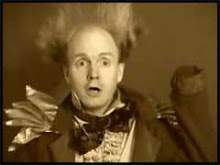 PRETEND: Fool Others
PRETEND: Fool Others
For the occasion of my leaving Athens, Ohio and going to New York City for an internship, my college housemate Michael and I decided to throw me a surprise party. The surprise would be for the guests, not me.
Michael sent out invitations and planned the event with friends who had no idea of the deception. One person was even afraid that he had accidentally let the secret slip in my presence.
Some friends showed up earlier than expected to help decorate, which meant I quickly had to hide in the kitchen closet for a long time, trying not to laugh out loud. Then, when everyone had assembled, another friend, Doug, came driving up to the house in my car, wearing a hat I occasionally wore. Sporting clown noses made from egg cartons, the guests hid and when Doug opened the door, they jumped up, yelled, "surprise!" and pelted him with sponges. Then I jumped out of the closet, also wearing an egg carton clown nose, and yelled, "surprise!" numerous times, until they slowly began to realize that Doug was not me, that I was me. They quickly retrieved the sponges and aggressively pelted me. A good time was had by all.
Most of my friendships have since been mended, and people still talk about the infamous surprise party 24 years later.
Fools are sometimes called tricksters. They make fools out of others. But if you've been following this series, thinking foolishly is not such a bad thing (not always). In their minds, fools are doing a service for others, helping others see the world in new ways.
In his book All Marketers are Liars, Seth Godin gives the example of the Riedel wine glass that makes wine taste better, an untrue story, but a good one: "...the very act of believing it makes the statement true. Because drinkers believe the wine tastes better, it does taste better. [Godin, 2005}" As Godin points out, liar is just a more dramatic word for storyteller, and that's how authentic stories effectively spread.
You have a desired solution, and by corralling co-conspirators in your folly, you realize your common dreams. Like a magician, you turn your audience into creative collaborators who suspend disbelief in your vision for the enjoyment of all.
"You can fool too many of the people too much of the time."
—James Thurber
Think: Who can I fool? How can I fool them? How will they benefit from being fooled?
Tomorrow: How to Think Like a Fool #43: Fool Yourself
Previous "How to Think Like a Fool" Posts
 PRETEND: Enjoy Failure
PRETEND: Enjoy Failure PRETEND: Know Everything
PRETEND: Know Everything Fools pretend to know everything. It's a survival tactic. They appear to be frauds and impostors when they take on a job they are not qualified for. But how else would they get the job? And where else would they get the confidence to try anything new?
Fools pretend to know everything. It's a survival tactic. They appear to be frauds and impostors when they take on a job they are not qualified for. But how else would they get the job? And where else would they get the confidence to try anything new? PRETEND: Go Through the Motions
PRETEND: Go Through the Motions PRETEND: Overreact
PRETEND: Overreact PRETEND: Get Caught Up in the Moment
PRETEND: Get Caught Up in the Moment PRETEND: Fool Yourself
PRETEND: Fool Yourself PRETEND: Fool Others
PRETEND: Fool Others PRETEND: Act Crazily
PRETEND: Act Crazily


